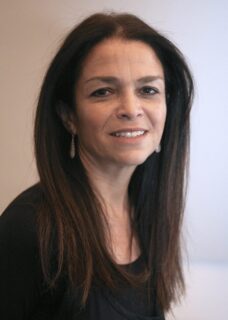Prof. Dr. Vivian Liska (University of Antwerp): Open Lecture and Workshop
In collaboration with the Research Training Group “Literature and the Public Sphere in Differentiated Contemporary Cultures”, the Institute for English and American Studies is pleased to announce that Professor Vivian Liska will be visiting us at FAU. The director of Jewish Studies at the University of Antwerp with expertise in German-Jewish literature, especially modernism and feminist theory, topics on which she has published extensively, Liska was elected to the Academia Europaea in 2014. Among other things, she edits the series Perspectives on Jewish Texts and Contexts (de Gruyter) and co-edits the Yearbook of the Society for European-Jewish Literature (de Gruyter). Her recent books include German-Jewish Thought and its Afterlife: A Tenuous Legacy (Indiana UP, 2017, German translation: Prekäres Erbe: Deutsch-Jüdisches Denken und sein Fortleben, Wallstein, 2021) and Kafka and the Universal (co-editor, de Gruyter, 2016), which will inform her events at our institute.
On Monday, October 28th, at 6 pm in B 302 (Bismarckstraße 1) she will give an open lecture on “Literarischer Messianismus: Franz Kafka – Else Lasker-Schüler – Paul Celan”. The talk will be moderated by Marlene Compton. The next day, Tuesday, October 29th, at 10 am in C 201 (Bismarckstraße 1) she will join Antje Kley’s American Studies Research Colloquium with a talk on “Martyrdom as Offence in Modern Jewish Literature”. If you would like to register for the colloquium, please do so with Anke Tänzler (anke.taenzler@fau.de).
If you have any questions, please contact Marlene Compton (marlene.compton@fau.de).
Lecture: “Literarischer Messianismus: Franz Kafka – Else Lasker-Schüler – Paul Celan”
Monday, 28.10.2024, 18.15-19.45, B 302
“Als Schnittpunkt zwischen Theologie und Politik, Geschichte und Philosophie ist der Messianismus ein fundamentaler Aspekt deutsch-jüdischen Denkens im frühen 20. Jahrhundert. Während der Stellenwert messianischen Denkens bei Philosophen von Hermann Cohen über Walter Benjamin, Gershom Scholem und Franz Rosenzweig unangefochten ist, sind aus der jüdischen Tradition entspringende Erlösungsvorstellungen in der deutsch-jüdischen Literatur nicht nur weniger erforscht, sondern auch schwieriger auszumachen. Dies ist nicht zuletzt darauf zurückzuführen, dass sie dort weniger explizit aufscheinen und sich zu keiner Lehre oder Ideologie zusammenschließen. Wie Beispiele aus dem Werk von drei der bedeutendsten deutschsprachigen jüdischen Autoren des vorigen Jahrhunderts (Franz Kafka, Else Lasker-Schüler und Paul Celan) zeigen, kann jedoch gerade in literarischen Schriften die komplexe, auf Unabgeschlossenheit, Dissens und entgrenzendem Möglichkeitssinn beruhende Affinität zwischen Messianismus und Moderne erkannt werden.”
Research Colloquium: “Martyrdom as Offence in Modern Jewish Literature”
Tuesday, 29.10.2024, 10.15-11.45, C 201
“Martyrdom – the readiness to suffer or let oneself be killed for the sake of a cause or principle – has been practiced in many different cultures throughout history. It is often regarded as a means of affirming and strengthening the identity of a group. In recent years, comparisons between the specific attitudes to martyrdom in Judaism, Christianity and Islam have become an urgent and controversial topic involving conflicting views on the interrelation between the different religions. Contemporary commentators on the Jewish approach to martyrdom disagree about its status and role in Jewish scriptures, history and cultural tradition. My lecture highlights the importance of the respective medium in which martyrdom has been transmitted in the different religions. It shows how the Jewish emphasis on the written text – as opposed to visual art or oral exhortation – prevents the idea of “dying for God” to become an ideal to strive for. Several examples from modern Jewish literature – Franz Kafka, Nelly Sachs, Phillip Roth, David Grossman – are invoked in order to illustrate the link between the written word and the critical questioning of martyrdom as a means of consolidating religious identity. Seemingly far removed from Jewish scriptures, these literary texts echo their basic reservations about sacrificing one’s life for the sake of a cause.”
